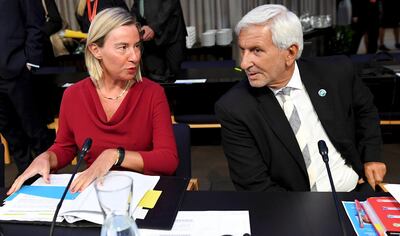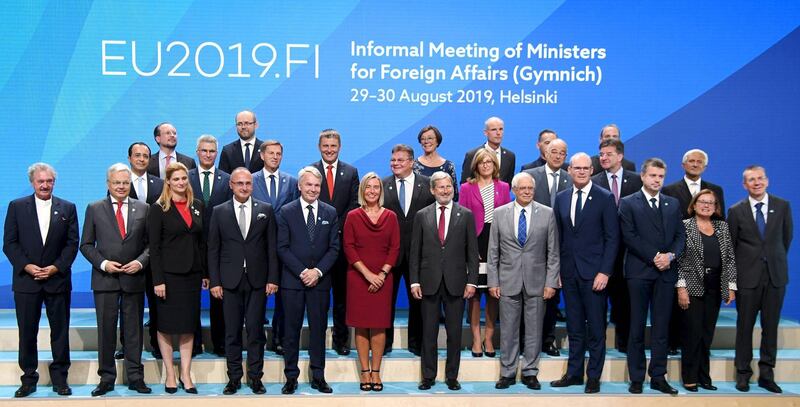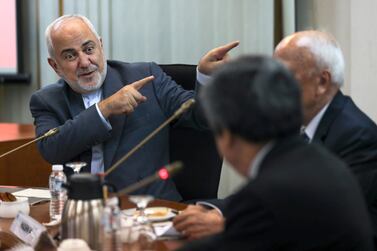European foreign ministers called on Thursday for intensified dialogue with Iran to capitalise on the French initiative at the G7 in Biarritz while reiterating the preservation of the 2015 nuclear must remain a top priority.
As foreign ministers from across the EU met in Finland, the bloc's chief diplomat, Federica Mogherini, said President Emmanuel Macron’s invitation for the Iranian foreign minister to attend the summit had broad support. Mr Macron hopes to create enough common ground for direct talks between Iranian and US representatives.
Tensions are high in the Gulf after a series of incidents in which oil tankers suffered sabotage attacks and Iranian forces seized a British-flagged tanker in early July.
Washington has been locked in a bitter standoff with Tehran since US President Donald Trump unilaterally pulled out of the 2015 deal, officially known as the Joint Comprehensive Plan of Action, and re-enacted economic sanctions. Ms Mogherini said that European was deepening its efforts to salvage the deal, adding "first and foremost what is existing needs to be preserved".

“We are always in favour of talks. The more people talk, the more people understand each other, the better – on the basis of clarity and on the basis of respect,” Ms Mogherini said.
“Our constant focus – from the European Union, from my personal side, but also from our member states and that obviously includes France, but also Germany, the UK – has always been in these years to preserve the nuclear deal with Iran. And obviously on the basis of the full respect of its provisions,” she said.
"#JCPOA is a @UN Security Council resolution Annex - so it is not an international agreement, it is not a bilateral agreement. And we will always advocate in favour of the full respect by all sides of the UN Security Council resolutions and that includes #IranDeal" @FedericaMog pic.twitter.com/z5xp6KHor4
— European External Action Service - EEAS 🇪🇺 (@eu_eeas) August 29, 2019
Heiko Maas, the German foreign minister, said diplomats had seized on a potential opening for dialogue.
"Now it's about operationalising that and making sure everyone makes a contribution, including Iran, which leads to de-escalation in the region," he said.
Mr Trump appeared open to French proposals for a summit with Iranian President Hassan Rouhani, as has US Defence Secretary Mark Esper who said this week “we want to talk with Iran and talk about a diplomatic path forward”.
However a hardliner backlash directed at Foreign Minister Mohammad Javad Zarif has forced the Iranians to put preconditions on talks. He said the United States must observe the deal and cease "economic terrorism" if Mr Trump wants to meet with President Rouhani.
"The United States is engaged in an economic war against the Iranian people and it won't be possible for us to engage with the United States unless they stop imposing a war and engaging in economic terrorism against the Iranian people," he said on Wednesday.
EU countries have considered a variety of proposals to keep Iran on board, including a $15bn credit line to keep open Iran trade. While the US has said it wants to reduce Iran’s oil exports to zero, some ministers hope that Washington will grant new waivers to encourage Tehran into dialogue.
The Europeans are also exploring their own effort to bolster maritime security in the Arabian Gulf. Only the UK of the EU nations has joined a US-led Gulf operation to protect commercial shipping, floating instead their own observation mission.
A new proposal, which Ms Mogherini underlined was not a military move and is still in its planning stages, would see the creation of a “mechanism” that would allow member states' naval assets to share what they observe and analysis.
"If there are no security risks in the Strait of Hormuz then we don't need any mission. But unfortunately it's Iran who has posed the risk," said Finnish Foreign Minister Pekka Haavisto.
Mr Haavisto also urged Iran to stick by the nuclear agreement, insisting that the Islamic Republic "shouldn't play with the idea of enriching uranium and so forth".
Speaking after talks with the EU defence ministers, Ms Mogherini said it was “too early to say” if the observation mission would happen in the Strait of Hormuz.
Before the talks Ms Mogherini said the priority in the Strait was the “security, safety and freedom” of maritime routes.
“But we also have a very clear interest in an approach that helps de-escalation and a co-operative dynamic of the players of the region,” she added.
French defence minister Florence Parly said as many as five countries had signed up to the potential mission.
"We must guarantee free navigation and security in the Strait of Hormuz, a vital region for the transport of hydrocarbons," she told AFP.
"But there is no question of creating an escort force – rather a dissuasive presence with an exchange of information."
German defence minister Annegret Kramp-Karrenbauer said it was vital diplomatic efforts were not endangered.
"If we speak about whatever operation there we need to be careful to avoid any kind of military escalation," said Edgars Rinkevics, foreign minister of Latvia, which currently has one of its seamen in Iranian custody.







